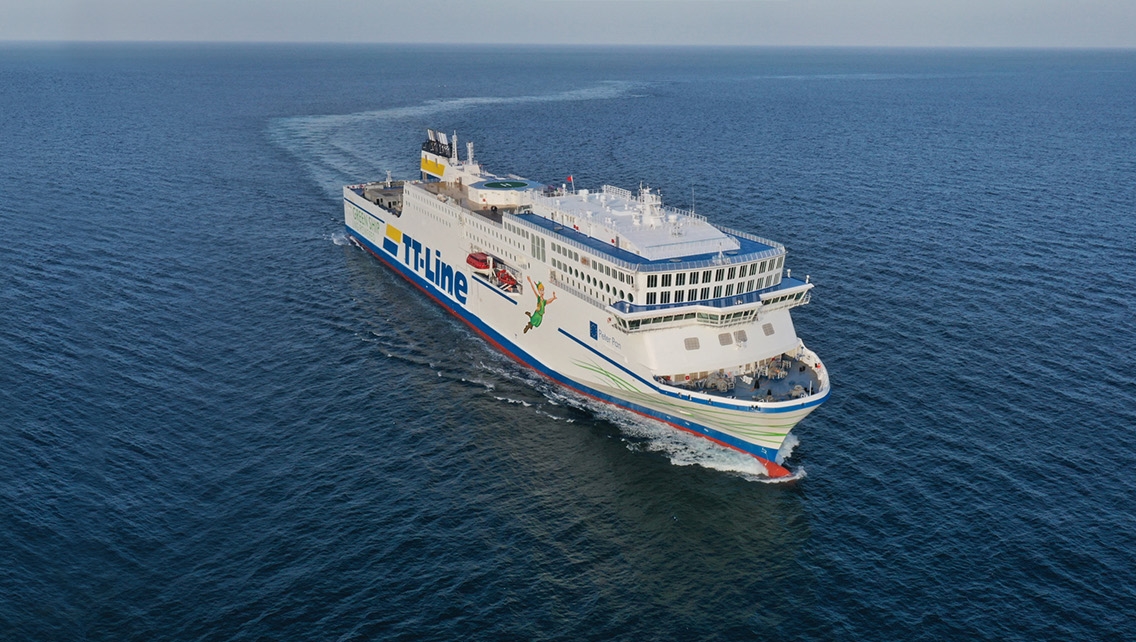The Lübeck-based ferry company TT-Line is celebrating a special milestone Monday (Nov28): the second ship in a new generation of ferries, the so-called Green Ships, has been delivered to the company. The new, environmentally friendly ferry Peter Pan is now officially part of the fleet with which TT-Line is fully committed to sustainable ship operations.

The first of two Green Ships was only delivered to the Lübeck ferry company in March of this year and has been in service for TT-Line on the Baltic Sea since April 26, 2022.
"After a successful high season with our first newbuild, the seventh Nils Holgersson in the history of TT-Line, we are all the more looking forward to the soon commissioning of our second Green Ship, the new Peter Pan," says Managing Director Bernhard J. Termühlen.
A few days after delivery in Nanjing, China, the ship sets off on the 49-day journey towards Travemünde. First, cargo is loaded in China that will be transported to Northern Europe. Avoiding an empty voyage was particularly desirable for TT-Line as it has a significant positive impact on the environmental footprint of the maiden voyage.
After stops in Singapore, Colombo (Sri Lanka) and Jeddah (Saudi Arabia), the route continues through the Suez Canal into the Mediterranean Sea. In the port of Zeebrugge, the transported cargo will be unloaded and equipment and service staff will be taken in to carry out equipment work inside the Baltic Sea ferry and to prepare the ship for its first commercial voyage. Finally, the route around northern Denmark leads to Travemünde. It is expected to enter scheduled service in the middle of the first quarter of 2023.
Like her sister ship Nils Holgersson, the new Peter Pan also has a number of future-oriented technologies to offer.
“Sustainability has been a top priority at TT-Line for years. It is therefore a matter of course for us that our new Green Ships are equipped with a variety of environmentally friendly technologies to minimize our ecological footprint and thus make a contribution to protecting our Baltic Sea,” says TT-Line COO Andreas Schärli.
The demands on the new ships were high: The Green Ships Nils Holgersson and Peter Pan are the first ferries in the southern Baltic Sea to be able to run on environmentally friendly liquefied natural gas (LNG), which is currently considered the cleanest ship fuel, and are approved for the use of bio-LNG fully prepared.
In addition to the environmentally friendly fuel, further consistent investments in environmentally friendly technologies are innovative: An energy-efficient air conditioning system ensures minimal energy consumption. Engine heat recovery system saves additional energy. The Green Ships are also fully equipped with LED light sources, which reduce power consumption by 80% and ensure a tenfold longer service life. The optimized hull, including a specially designed bulbous bow, results in low fuel consumption, taking into account the ships' speed profile. Special shaft seals with additional air chambers prevent water contamination from lubricating oil. Extensive waste management conserves resources and only environmentally friendly cooling water additives and cleaning agents are used. Plastic products are avoided as far as possible. In general, the key aspect when selecting suppliers is the environmental friendliness of the solutions. More than 90 percent of the technology in the new Green Ships is provided by European suppliers. Furthermore, charging stations are available to passengers on the car decks, where e-vehicles can be conveniently charged during the crossing. More than 90 percent of the technology in the new Green Ships is provided by European suppliers. Furthermore, charging stations are available to passengers on the car decks, where e-vehicles can be conveniently charged during the crossing. More than 90 percent of the technology in the new Green Ships is provided by European suppliers. Furthermore, charging stations are available to passengers on the car decks, where e-vehicles can be conveniently charged during the crossing.
Sustainable action also applies to life on board. Local products from Sweden, pre-booking of meals (also to avoid food waste), reusable crockery and sustainable products in the on-board shop.